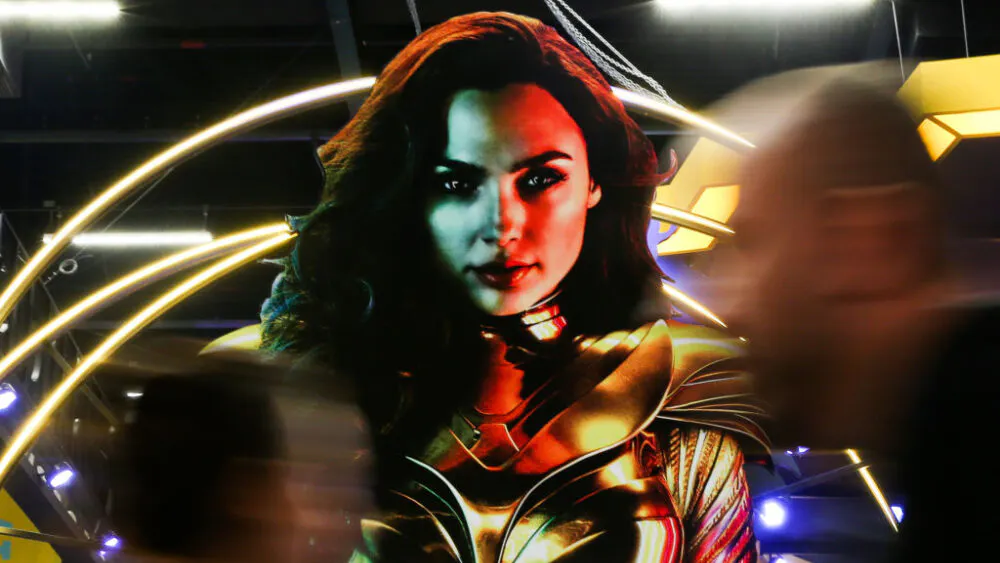Wonder Woman 1984, the hotly anticipated sequel to the 2017 Amazon goddess origin story, recasts Gal Gadot as the titular heroine. As the title suggests, the sequel is set seven decades after the events of the first film. Gadot is no longer a bedazzled wanderer but a successful archeologist.
Wonder Woman 1984 ejects Zach Snyder and Allan Heinberg from the writer’s room, diverting greater creative control to the director, Patty Jenkins. The resulting plot is a lackadaisical mess; it’s a half-baked rewrite of Disney’s Aladdin with none of the charm and a heaping supply of political commentary riddled throughout.
The original Wonder Woman had Gal Gadot deflecting bolts of lightning hurled at her by Aeries — the Greek God of war. She channelled enough energy to tear a hole through his torso, eviscerating him — a God! In Wonder Woman 1984, Wonder Woman’s powers are inexplicably dwarfed and blunted. Here, Gal Gadot can barely fight her way through a cadre of White House security guards. In the same scene, Gadot is handily beaten by her former museum coworker (Kristen Wiig) who, through the ancient Aladdin-esque relic at the crux of this film, “wished” for Diana’s charm and strength.
The sequel cast Pedro Pascal as the main villain: a Ponzi scheme-peddling charlatan with a penchant for power. How Pascal was able to maintain a straight face while delivering such tacky and cartoonish lines as, “I am not a loser; he is a loser,” is a triumph of his skill as an actor.
But Pascal’s vainglorious oil baron goes beyond the boilerplate comic material from which Wonder Woman is sourced. Everything from Pascal’s hair to his catchphrases, television personality and yearning for approval is cut and curated to create an effigy of Donald Trump. If you thought Hollywood’s fetish for browbeating Republican presidents was limited to the actual years of their tenure, think again!
And it doesn’t stop there. With the film set in the 1980s, Patty Jenkins couldn’t waste the opportunity to further wield Wonder Woman as a cinematic cudgel for a knock at President Ronald Reagan. When Pascal asks for his greatest wish, the stand-in for Reagan replies, “What is there to wish for but more? More nuclear weapons. More than they have.”
Pinned against one of the laziest Cold War plots to ever leave the Hollywood conveyer belt, Wonder Woman 1984 attempts to paint Reagan as a war-obsessed buffoon whose strategic plan to stockpile armaments results in war with the Soviets. Contrary to Tinseltown’s myth-making revisionist history, it was Reagan’s military doggedness that both deterred Soviet aggression and led to the USSR’s eventual demise.
For a film that so fervently emphasizes the decade in which it takes place — the title is Wonder Woman 1984 — it rarely makes use of this epoch and all its dazzling potential. Aside from a brief scene poking fun at spandex suits and fanny-packs, the film may as well have been set in any other decade.
With its 1980s Americana backdrop, the soundtrack was an easy opportunity to imbue lighthearted and synthesizer-fueled fun into the film. 1984 saw the release of Springsteen’s Born in the U.S.A, Van Halen’s 1984, and Prince’s Purple Rain (just to name a few). But instead of borrowing from this breadth of pop music that permeated the 80s, Wonder Woman 1984 instead glides through a formulaic dirge of orchestration provided by Hans Zimmer.
Gal Gadot and Chris Pine — as revealed in the trailer, Pine miraculously returns to life — share the same chemistry that buoyed the original film. Except here, in Wonder Woman 1984, the pair are severely hampered by a bilious script. The dialogue is lifeless and glib. It’s miraculous that this was approved by a studio, with such insufferable platitudes as, “truth is the most beautiful thing in the world.” The last time both Gal Gadot and Kristen Wiig participated in such an elegy to excruciating nausea, they were singing John Lennon’s “Imagine” — and at least that was only three minutes long.
Wonder Woman 1984 isn’t just too long; it’s plagued with abysmal pacing. It manages to feel both rushed and dragged out. There’s no sane reason why anybody needs to sit through a ten-minute sequence of Gal Gadot and Chris Pine flying dazzle-eyed through fireworks (in a fighter jet they commandeered without explanation) only to hear Pine elucidate on the vagaries of aeronautics, explaining, “it’s not so easy really; it’s wind and air.”
While immediate sequels to big blockbusters rarely outdo their respective originals, Wonder Woman 1984 delivers with the languid monotony and banal storytelling you would expect from a fifth sequel, at which point films become aimless scenes thrown together for fan service without much afterthought. In Wonder Woman 1984, Wonder Woman manages to leap over a dozen hypothetical sequels, and deliver just that: a flaccid collage of disparate scenes with no coherent plot or character development, much less a vision for the future of the franchise.
Follow Harry Khachatrian on Twitter
The views expressed in this opinion piece are the author’s own and do not necessarily represent those of The Daily Wire.

Continue reading this exclusive article and join the conversation, plus watch free videos on DW+
Already a member?

.png)
.png)

